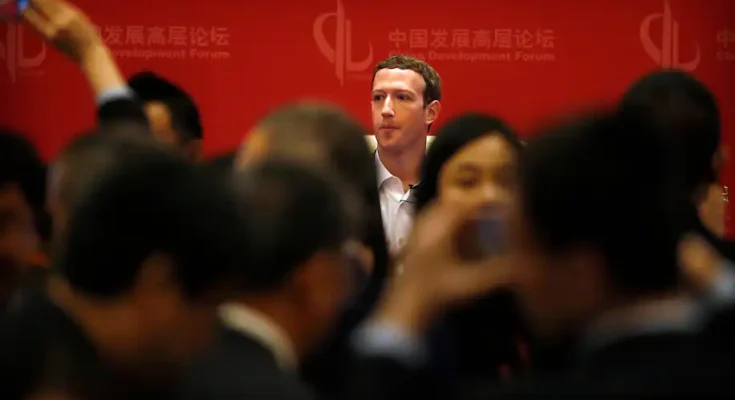Meta was willing to go to extreme lengths to censor content and shut down political dissent in a failed attempt to win the approval of the Chinese Communist Party and bring Facebook to millions of internet users in China, according to a new whistleblower complaint from a former global policy director at the company.
The complaint by Sarah Wynn-Williams, who worked on a team handling China policy, alleges that the social media giant so desperately wanted to enter the lucrative China market that it was willing to allow the ruling party to oversee all social media content appearing in the country and quash dissenting opinions.
Meta, then called Facebook, developed a censorship system for China in 2015 and planned to install a “chief editor” who would decide what content to remove and could shut down the entire site during times of “social unrest,” according to a copy of the 78-page complaint exclusively seen by The Washington Post.
Wynn-Williams bolstered her SEC complaint with internal Meta documents about the company’s plans, which were reviewed by The Post. Wynn-Williams, who was fired from her job in 2017, is also scheduled to release a memoir this week documenting her time at the company, titled “Careless People: A Story of Where I Used to Work.”
According to a memo in the complaint, Meta leaders faced aggressive pressure by Chinese government officials to host Chinese users’ data to local data centers, which Wynn-Williams alleges would have made it easier for the Chinese Communist Party to covertly obtain the personal information of its citizens.
“Once data is stored locally, companies are pressured to comply with Beijing’s demands or risk losing access to Chinese consumers.”
For years, Meta has cast China as a foe to a free global internet. In a 2019 Georgetown University talk, Zuckerberg warned that China was “exporting their vision of the internet to other countries.” The next year, then-vice president of global affairs Nick Clegg bemoaned in a Post op-ed that governments were following China’s lead to wall off the internet “from the rest of the world.”
The company’s anti-China commentary has intensified since DeepSeek’s AI assistant catapulted to the top of app stores in January, with the China-based company boasting that its AI technology was developed at a fraction of the cost of competitors from Meta and OpenAI.
In a Threads post, Meta’s chief global affairs officer, Joel Kaplan, wrote that the company would work with “the Administration to keep the US at the cutting edge of AI and make sure the global AI standard is based on our shared values, not China’s.” Zuckerberg noted in January that the company would partner with President Donald Trump to “push back on governments around the world that are going after American companies and pushing to censor more,” adding that “China has censored our apps from even working in the country.”
“One of the top priorities for President Trump is the West winning this critical [AI] race and yet for many years Meta has been working hand in glove with the Chinese Communist Party, briefing them on the latest technological developments and lying about it,” said Wynn-Williams, who is now a technology policy consultant. “People deserve to know the truth.”
Meta spokesman Andy Stone Stone said in a statement that it was “no secret” the company was interested in operating in China.
“This was widely reported beginning a decade ago,” he said. “We ultimately opted not to go through with the ideas we’d explored, which Mark Zuckerberg announced in 2019.”
‘Project Aldrin’
A decade ago, Meta saw China as an unconquered and highly lucrative opportunity, with millions of untapped internet users — more than existed in the American market by some estimates. Chinese sellers were already buying scores of ads on Facebook through resellers to target customers outside the country, according to Wynn-Williams. Zuckerberg told top executives including COO Sheryl Sandberg and former communications and public policy head Elliot Schrage that bringing Facebook to China would fulfill the company’s mission of connecting the world.
The complaint alleges that behind the scenes, Zuckerberg assembled a “China team” in 2014 to develop a version of its services that could be legally offered in China — a project code-named “Project Aldrin” after the astronaut Buzz Aldrin, who landed the first manned spacecraft on the moon.
“In exchange for the ability to establish operations in China, FB will agree to grant the Chinese government access to Chinese users’ data — including Hongkongese users’ data,” one privacy policy staffer wrote.
By 2015, Meta and Chinese officials started negotiating a more detailed plan for the company to operate in China later that year, according to the complaint.
To aid the effort, Meta built a censorship system specially designed for China to review including the ability to automatically detect restricted terms and popular content on Facebook, according to the complaint. The company agreed to hire at least 300 content moderators to support the system, the documents show.
Despite losing one of its chief regulatory promoters in the country, Meta continued to pursue the China market. In 2017, Meta covertly launched a handful of social apps under the name of a China-based company created by one of its employees, according to the complaint.
That same year, Meta restricted the account of Guo Wengui, a wealthy Chinese businessman and critic of the Chinese government, after Zhao Zeliang, a top internet regulator in the country, suggested taking action could demonstrate the company’s willingness to “address mutual interests,” according to the complaint.
“If there is nothing we can do [about Wengui’s account], there will be an impact on our cooperation,” Meta officials concluded according to internal notes about a meeting contained in the complaint. Later that year, Meta took down a page affiliated with Wengui and restricted his account, citing violations of its content rules.
Now, Meta aims to benefit from Washington’s aggressive stance on China. Zuckerberg told employees during a companywide meeting this year that its business would be helped if China-based TikTok ends up being banned in the United States.
“They are one of our main competitors,” said Zuckerberg, according to a recording of the meeting heard by The Post. “That’s a card we get to turn to.”




